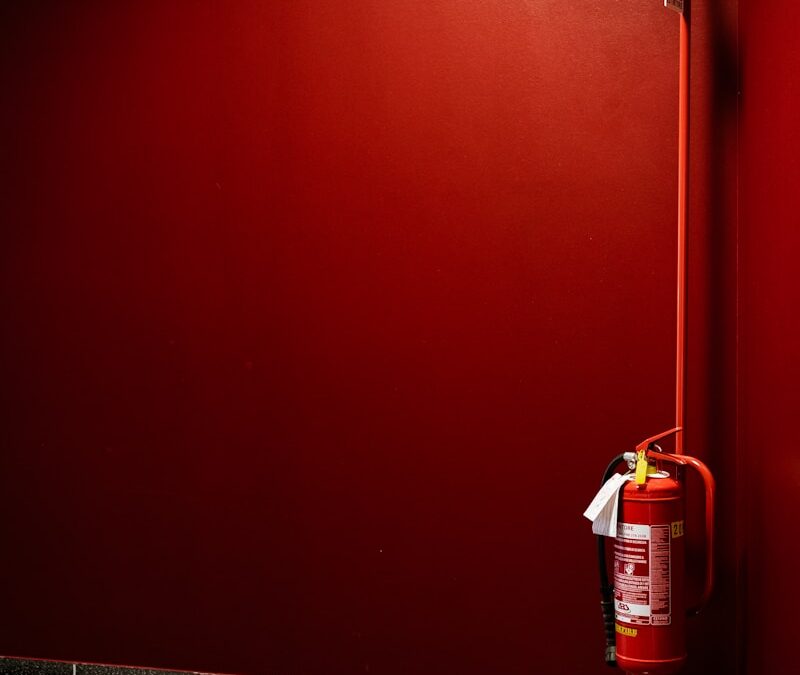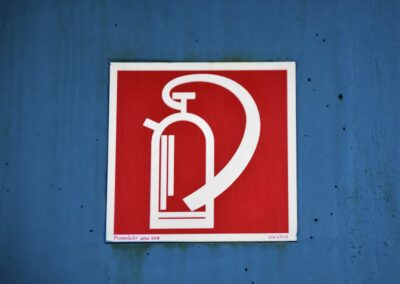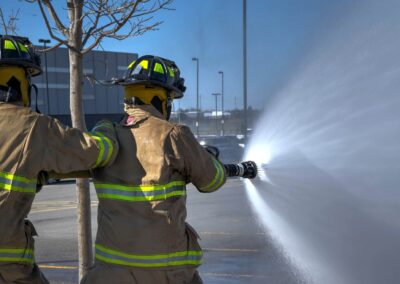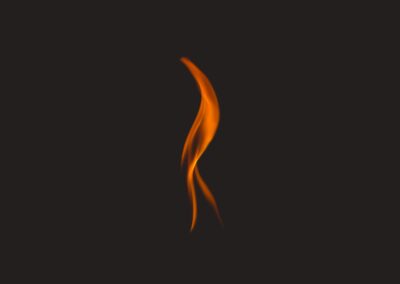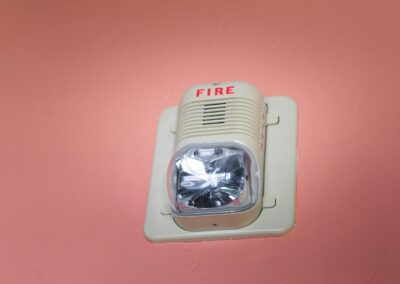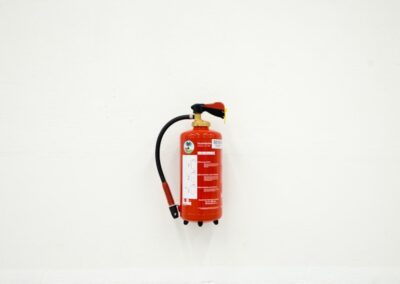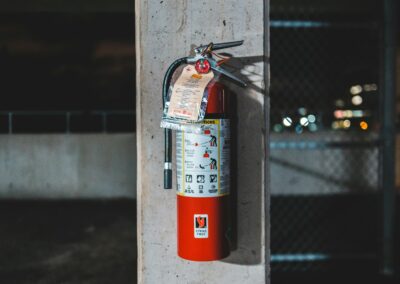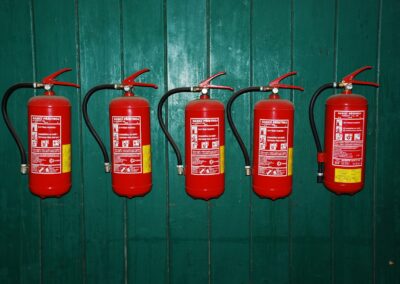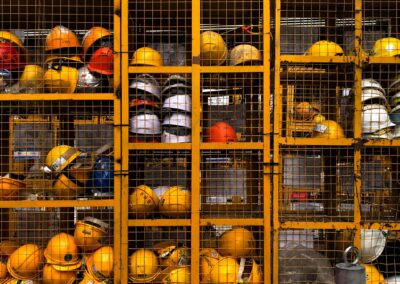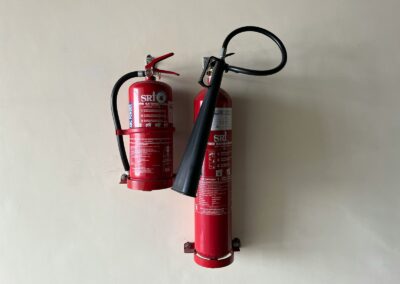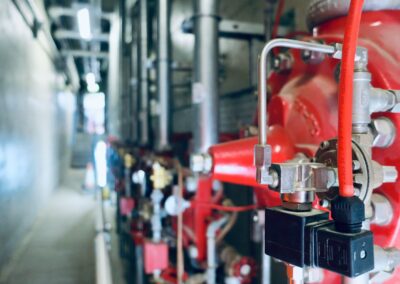Innovative Approaches to Fire Risk Assessment
Enhancing Safety with Smart Fire Detection Systems
The integration of smart fire detection systems represents a significant advancement in safety and fire risk management. These systems utilize advanced technologies such as Artificial Intelligence (AI) and the Internet of Things (IoT) to monitor environmental conditions like humidity and temperature, providing comprehensive data for fire risk assessment. In regions like Saudi Arabia and the UAE, where rapid urbanization and industrial growth pose increased fire risks, the adoption of smart fire detection systems is crucial for ensuring public safety.
In Riyadh, smart fire detection systems are being implemented in residential, commercial, and industrial settings. These systems are equipped with sensors that continuously monitor environmental parameters and detect anomalies indicative of fire hazards. For instance, a sudden rise in temperature or a drop in humidity levels can trigger an alert, enabling rapid response to potential fire incidents. By providing real-time data and early warnings, these systems significantly enhance fire prevention and protection measures.
Dubai is also leveraging smart fire detection systems to bolster its fire safety infrastructure. The city has integrated these systems with its existing emergency response frameworks, ensuring seamless communication and coordination during fire incidents. The use of AI algorithms allows for predictive analysis, identifying high-risk areas and periods based on historical data and current conditions. This proactive approach to fire risk management not only minimizes the likelihood of fire outbreaks but also ensures a swift and efficient response when fires do occur.
The Role of AI and IoT in Fire Detection
Artificial Intelligence (AI) and the Internet of Things (IoT) are at the core of smart fire detection systems. AI algorithms can analyze data from various sensors in real-time, identifying patterns and anomalies that may indicate fire risks. In Saudi Arabia, AI-powered fire detection systems are enhancing the accuracy and reliability of fire risk assessments. These systems can process vast amounts of data, including temperature, humidity, and smoke levels, to provide early warnings and actionable insights.
In Riyadh, AI-driven fire detection systems are being deployed in high-risk areas such as industrial zones and densely populated neighborhoods. These systems use machine learning to continuously improve their predictive capabilities, adapting to new data and evolving fire risk patterns. By integrating AI with IoT devices, Riyadh’s fire safety infrastructure is becoming more responsive and efficient, ensuring better protection for its residents and assets.
Dubai is also at the forefront of utilizing AI and IoT for fire detection. The city’s smart fire detection systems are interconnected with its broader smart city infrastructure, enabling real-time data sharing and coordinated responses. For example, if a fire is detected in a building, the system can automatically alert nearby fire stations, traffic control centers, and emergency medical services. This integrated approach ensures that all relevant stakeholders are informed and can respond promptly, minimizing damage and enhancing public safety.
Smart Technology in Business Success and Leadership
Leadership in Adopting Smart Safety Solutions
Successful implementation of smart fire detection systems requires visionary leadership and a commitment to innovation. Business executives and mid-level managers in Saudi Arabia and the UAE are driving the adoption of these advanced technologies to enhance safety and operational efficiency. By fostering a culture of innovation and investing in smart solutions, these leaders are ensuring that their organizations remain competitive and resilient in the face of safety challenges.
In Riyadh, forward-thinking leaders are championing the integration of smart fire detection systems across various sectors. These leaders recognize the importance of proactive fire risk management and are committed to adopting the latest technologies to protect their assets and people. By partnering with technology providers and investing in research and development, they are setting a benchmark for other regions to follow.
Dubai’s leadership in adopting smart safety solutions is also noteworthy. The city’s business leaders are leveraging their strategic positions to promote the widespread use of smart fire detection systems. By prioritizing safety and innovation, these leaders are enhancing their organizations’ operational capabilities and ensuring long-term success. Their proactive approach to safety management not only protects their assets but also fosters a culture of trust and reliability among employees and stakeholders.
Project Management and Technological Integration
Effective project management is crucial for the successful adoption of smart fire detection systems. Business executives and project managers in Saudi Arabia and the UAE are utilizing advanced project management techniques to ensure the smooth implementation of these technologies. This includes meticulous planning, risk assessment, and stakeholder engagement to address potential challenges and ensure that the projects meet their objectives.
In Riyadh, project managers are adopting agile methodologies to manage the deployment of smart fire detection systems. This approach allows for iterative development and continuous feedback, ensuring that the solutions are refined and optimized over time. By involving all stakeholders in the process, project managers can address concerns and foster a sense of ownership among employees and end-users.
Dubai’s project management practices are equally exemplary. The city has established robust frameworks for managing technological projects, ensuring that they are completed on time and within budget. By leveraging modern project management tools and techniques, Dubai is able to effectively coordinate the efforts of various stakeholders and ensure the successful integration of new technologies. This not only enhances the efficiency of fire detection programs but also sets a precedent for other regions to follow.
Conclusion
The integration of smart fire detection systems is transforming the landscape of fire safety and risk management. By leveraging AI and IoT technologies, these systems provide comprehensive data and early warnings, significantly enhancing fire prevention and protection measures. Strong leadership and effective project management are crucial for the successful adoption of these technologies, ensuring that organizations in Saudi Arabia, the UAE, Riyadh, and Dubai remain at the forefront of safety innovation. As technology continues to evolve, the impact of smart fire detection systems on public safety and operational efficiency will only grow, leading to safer, more resilient communities.
—
#SmartFireDetection #AIinSafety #IoT #FireRiskManagement #TechInnovation #SaudiArabiaTech #UAETech #RiyadhLeadership #DubaiInnovation

